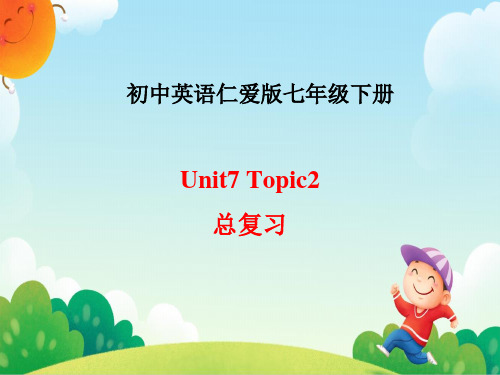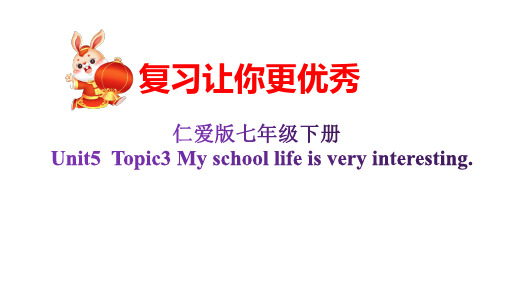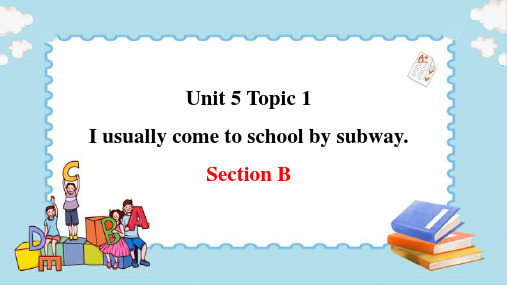仁爱英语七年级下册unittopic知识点复习实用课件
仁爱版七年级英语下册Unit 7 Topic 1 Section D课件

1st
first 12th twelfth
2nd second
20th twentieth
3rd third 31st thirty-first
5th fifth 40th fortieth
8th eighth 90th ninetieth
9th ninth 101st
one hundred and first
TF
4.Marry and her father want to make a
birthday cake at home. T F
Watch and retell.
3. Written work.
When is your father’s/mother’s birthday? What will you do to celebrate it? Check () the things below. Then write your plan.
When _w_e_re__ you born? I w_a_s___ born in January,1999.
When was Kangkang born? He _w_a_s__ born on May 13th, 2002.
Where w_a_s__ he born? He was born in China.
谢谢观赏
You made my day!
我们,还在路上……
It's … centimeters long/wide.
What do we use it for?
Object
What shape? How long? How wide? What do we use it for?
Unit 7 topic 2 总复习课件 2020-2021学年仁爱版英语七年级下册

3.我和我妹妹都喜欢玩球类游戏。 My sister and I both like playing ball games.
句式
结构
肯定句 主语+can+1. 动词原形 (其他).
否定句
主语+can+2. not +动词原形(+其 他).
一般疑问句 3. Can +主语+动词原形(+其他)?
肯定回答: Yes,主语+can. 简略回答
否定回答: No,主语+4. can’t .
[运用]将下列句子进行句型转换
1. Jane can write stories(改为否定句) Jane can’t write stories.
What can you do? 4. Shelly could sing and dancc in 2020.(改为否定句)
Shelly couldn’t sing or dance in 2020.
选择疑问句
选择疑问句是指说话人提出两种或两种以上的情况,要求对 方选择一种情况回答。其表现形式可以是一般疑问句形式, 也可以是特殊疑问句形式。请仔细观察下面的例子,然后补 全结论部分所缺的内容。 [例子] 一般疑问句形式的选择疑问句 1.----Is your new school big or small?
4.放学后,咱们做些户外活动吧。 Let's do some outdoor activities after school.
5.两年前她就会唱英语歌曲。 She could sing English songs two years ago .
仁爱版七年级下Unit5-Topic1语法专项课件频度副词PPT课件一等奖新名师优质课获奖比赛公开课

考 察 频 度 副 词 。 hardly 几 乎 不 , sometimes 有 时 , only仅仅,usually经常。由too expensive(太贵)可 知,“几乎不看电影”,所以答案选A。
考点大观 易错辨析 通关训练
【典例3】— _____ is it from home to the shopping mall?
→How often do you write to your brother?
考点大观 易错辨析 通关训练
易错点1 how often与how long/far/soon旳使用方法
区别 How often “多久一次”,用来对表达频率旳副词或短语提问。
(多用于一般目前时)
How long
问询时间时,表达“多长时间”,回答用“for+时间段”或
“有时;不时”,意思与at times相近,多用于一般目前 时。
some times “几次;几倍”,其中time为“次;倍”,是可数名词。
some time “某些时间”,其中time意为“时间”,是不可数名词。 sometime “某个时候”,常用于一般将来时。
易错点3
考点大观 易错辨析 通关训练
这冰很硬,能够在上面滑。
考点大观 易错辨析 通关训练
【典例1】— Zhang lili, “The most beautiful teacher”, is good to
her students.
— Yes, and she is ________ popular with her
students.
never旳频度是0,意为“历来不;永不”。
频度副词经典例句
考点大观 易错辨析 通关训练
Unit 5 Topic 3【复习课件】七年级英语下册话题复习(仁爱版)

语法大舞台
7.观察下列在课本中出现的句子:
.Do you want to see different kinds of stamps?
.My teachers and classmates are kind to me.
type
n.种类
kind
sort
a kind/type/sort of ... differents/many kinds(types/sorts) of... all kinds of... kind of adv. 几分;有点
3.How much milk does he have?
4.How much money do you have?
提问数量
How many+可数名词复数
+一般疑问句。
1.我们班有多少人?
How many people are there in
our class?
2.冰箱里有多少牛奶?
How much+可数名词复数 How much milk is there in
up
考虑
2.Think about the question carefully.
=consider
实践固真知
1.--What are you doing?You look so happy.
-- I ’m
my parents.
A.thinking
B.thinking over
C.thinking about
11.夜晚 night
.
12.听起来;声音 sound .
13.二月 Feburary .
14.努力的;困难的; hard
艰难地;努力地 hard
Unit 5 Topic 1 Section D(25页)仁爱版七年级下册英语课件

Homework
1. Review the words, phrases and sentences. 2. Review adverbs and phrases of frequency. 3. Talk about the school life of your classmates. 4. Finish exercises of Unit 5 Topic 1 Section D.
If you are the interviewer, what questions will you ask?
Example: How many classes do you have in a day? What time do you usually get up? What time do you usually go to bed?
and find out more.
“
Interviewer: Good evening, boys and girls! Please welcome our new friend, Michael. He’s from America. Hello, Michael! Michael: Hello! Interviewer: We’d like to know about the school life of American students. How do they usually go to school? Michael: Well, many students usually take a yellow school bus or walk to school. Interviewer: Where do they usually have lunch? Michael: They usually have lunch at school and then begin class at about one o’clock in the afternoon. Interviewer: What time is school over, then? Michael: At about three o’clock. Interviewer: What do they do in their free time? Michael: They often play basketball and soccer. Interviewer: Well, I’m sorry we have no more time. Nice talking to you. Thank you.
Unit 5 Topic 1 Section B(22页)仁爱版七年级下册英语课件

Read 1a again and fill in the blanks.
Helen: Michael,what time do you usually _g_e_t _u_p__?(起床) Michael: I always get up _a_t about six o'clock. Helen: The early bird catches the worm. _H_o_w_do you usually come to school? Michael: I usually come to schoolo_n__fo_o_t, but _so_m__e_ti_m_e_sby bike. How about you ? Helen: I _s_e_l_d_o_m_ walk to school . I _o_f_t_en___ come by subway. What about you Sally? Sally: I _n_e_v_e_r _come to school by subway. I _a_lw__ay_s_ take a bus.
Hale Waihona Puke Activity watch TV in Frequency the afternoon
always
usually
often
sometimes
seldom
never
√
play soccer on Sundays
√
see a movie √
课堂总结
We learn: 1. some words: weekday, early, bird, catch, seldom, walk, never, ride, park, watch 2. some phrases: take a bus/car, do one’s homework watch TV, see a movie, play soccer 3. some sentences: The early bird catches the worm. I never come to school by subway.
Unit6Topic3单元复习课堂练习课件-仁爱版七年级英语下册
三、选择填空。
(C )1. In countries like the UK, people drive _______ the left.
A. in
B. at
C. on
三、选择填空。
( B )2. There is a park ________ from my home. Many people take a walk there.
一、翻译下列词组(或句子)。
5. 需要做某事 ______n__ee_d__t_o_d_o__s_th_.______ 6. 禁止停车。 ______N__o_p__a_rk__in_g_._________ 7. 禁止右转。 ______N__o_r_i_g_h_t_t_u_r_n_._______ 8. 红绿灯 __________t_r_a_ff_ic__li_g_h_t_s________
—It’s about 180 __k_i_lo_m__e_t_er_s__ (kilometer).
二、根据语境、音标或所给单词的提示完成句子, 每空一词。
3. We need to make a few small __c_h_a_n_g_e_s_ (change) to the report(报告). 4. Children’s lives are in __d_a_n_g_e_r___ /'deɪndʒə(r)/ every time they cross this road. 5. The park is open to the __p_u_b_l_ic__ /'pʌblɪk/ from morning till night.
三、选择填空。
(C )5. The sign(指示牌) A. No left turn B. No right turn C. No parking
Unit 6 Topic 3【复习课件】七年级英语下册单元复习(仁爱版)
crosswalk
traffic lights
Anything else?
Task 8.Look at each sign and match it with its
meaning.
You can learn words and
phrases by connecting them
to signs, symbols, diagrams
2
Hospital
Bank
Post Office
Bridge Bookstore
Park
Library
Shengli Road
Zhongshan Road
School
Restaurant
Supermarket
A
A: Excuse me, how can I get to the library? B:__G__o_a_l_o_n_g_X_i_n_h_u_a_S_t_r_e_etand________________t_u_rn__right at the first
英
语
仁爱版 七年级下册
Unit 6 Our Local Area Topic 3 How can I get to the library?
仁爱版 英语七年级下册
基础知识过过过 轻轻松松进课堂 高频考点导导航 研析考题点迷津 梳理语法建支架 指导写作构思路
W基础ar知m识ing up
一、快速说出下列单词或短语。
Restaurant
Supermarket
A
A: Excuse me, how can I get to the library? B: Go along Xinhua Street and turn right at the first crossing. It's about twenty meters along on the left.
最新仁爱版英语七年级下册Unit7 Topic2语法专项课件(情态动词can和could的用法)
I couldn’t speak English when I was three.
一般疑问句:could提前 Could you speak English when you were three?
易错点1
can
can 和 could的区别
could ①表示过去拥有的一般的能力。
①表示与生俱来的能力。
can的用法
1. 表示能力时,意为“能、会”。 例:He can speak a little Japanese. 他会说一点日语。 2. 表示请求或许可时,意为“可以”。 例:Can I help you? 要我帮忙吗? 3. 表示猜测时,意为“可能”。
例:Where can she go now? 她现在可能到哪里去了呢?
易错点1
can 和 could的区别
(can表请求) (could表更委婉请求)
Can I use your pen? Could I use your pen?Yes源自 of course you can.
注意:对请求、允许相关 问句的回答,只能用can。
【典例1】—______ I borrow your dictionary? —Yes, of course you ______. A. Can; could C. Can; can B. Could; can D. Could; could
Unit7 Topic2
语法专项课件
(情态动词can和could的 用法)
情态动词用法大观 情态动词三注意:
情态动词表示说话人的语气或情绪
情态动词无人称和数的变化
情态动词后跟动词原形
常见的情态动词: must, can, may, shall, could, might, should, will, would, need等。
仁爱版英语七年级下册知识点归纳(完整版)
仁爱版英语七年级下册知识点归纳(完整版)-CAL-FENGHAI-(2020YEAR-YICAI)_JINGBIAN仁爱版英语七年级下册知识点归纳?英语七年级下册知识点归纳Unit?5?Topic1?重点语法一般现在时(常与频度副词never,?seldom,?sometimes,?often ,usually,?always等连用)重点句型?—How?do?you?usually?come?to?school???—I?usually?come?to?school?by?subway.????????????—How?often?do?you?go?to?the?library????—Once/Twice/Three?times?a?week/Very?often/Every?day/Seldom重点详解1I?always?come?to?school?by?bus.???by+交通工具名称,表示使用某种交通方式,中间不加限定词,如果交通工具前有a,?the,?my?等限定词,就不能用by,而是用in或是on.???on?the?train=by?train???on?his?bike=by?bike???in?my?car=by?car.???巧辩异同on?foot?与?walk????on?foot?“走路”,是介词短语,不能作谓语,只作方式状语,位于句末。
??walk?“走路”,是动词,可以作谓语。
? ? ??go?to…on?foot=?walk?to? ? ???I?often?go?to?school?on?foot.?=I?often?walk?to?school.?????同样,go?to….by?bike?=?ride?a?bike?to?????? ? ? ? ? go?to….?by?car?=?drive?a?car?to????????? ??go?to?…?by?plane?=?fly?to????????? ? ? ? ? go?to…?by?bus?=?take?a?bus?to2???Come?on!?It’s?time?for?class.???????come?on?“快点,加油,来吧”。
- 1、下载文档前请自行甄别文档内容的完整性,平台不提供额外的编辑、内容补充、找答案等附加服务。
- 2、"仅部分预览"的文档,不可在线预览部分如存在完整性等问题,可反馈申请退款(可完整预览的文档不适用该条件!)。
- 3、如文档侵犯您的权益,请联系客服反馈,我们会尽快为您处理(人工客服工作时间:9:00-18:30)。
第11页/共19页
1.How is the weather in spring/summer/fall/winter? = what’s the weather like in spring/summer/fall/winter?
第8页/共19页
• 重点词组
29.在你的假期 30.戴太阳镜 31.散步 32.休息一会儿 33.开始做某事 34.回到某地
in /on your holiday wear sunglasses take a walk have a short rest begin to do sth. go/get back to +地点
• 重点单词
天气 weather 春天 spring 温暖的 warm 季节 season 夏天 summer 热的 hot 爬,攀登climb
冬天
winter
冷的
cold
下雨,雨 rain
下雪,雪 snow
阴雨的,多 rainy
雨的
remember
记得,记起 put on
穿戴
第1页/共19页
雨衣 raincoat 在外面 outside 下雪多的 snowy 多风的 windy 有雾的 foggy 多云的 cloudy 明亮的 bright
第12页/共19页
7.一切都好吗? 一切都很好。
8.昨天天气很晴朗也很温暖。 9.当你出去时,记得穿上你的雨衣。 10.温度是多少?
最高温度是七摄氏度,最低温度是零下二摄氏 度。
第13页/共19页
7. How are things going? Things are going very well.
last from…to…
21.开花,出版
come out
第7页/共19页
• 重点词组
22.下大雨 23.刮大风 24.明亮地照耀着 25.突然下雨 26.这很难说 27.学习做某事 28.非常明媚
rain heavily blow strongly shine brightly rain suddenly It’s hard to say. learn to do sth. nice and bright
=my favorite season is autumn. 5.I don’t like summer very much,
because it often rains. 6.it’s hard to say.i liked winter before,
but now I like summer best.
shine better
开花,出版
come out 猛烈地 heavily
Had better
Australia
most
第3页/共19页
收割,收获 harvest
忙碌的 busy
叶子(单复数)
立即,马上 right away
leaf leaves
= at once
我们自己 ourselves
风 强烈地 冰
wind 希望,期望
strongly
hope
ice
旅行,旅游
trip
帽子 京剧
hat
正午,中午
noon
Beijing Opera
第4页/共19页
• 重点词组
1.堆雪人 2.爬山 3.记得做某事 4.出去 5.穿上 6.在冬天 7.需要做某事
make snowmen
climb hills
remember to do sth.
go out
go outside
put on
in winter
need to do sth.
第5页/共19页
8.计划做某事 9.最好做某事 10.最好不要做某事 11.忙于做某事 12.复苏 13.后来 14.立即
plan to do sth. had better do sth. had better not do sth. be busy doing sth. come back to life later on at once =right away = right now
第6页/共19页
• 重点词组
15.看到某人正在做某事 see sb. doing sth.
16.散步
take a walk
17.变绿
turn green/ red /yellow
18.变暖、晴
get warm / fine / long…
19.多变
change a lot
20.从···持续到···
第9页/共19页
• 重点词组
35.做某事的最佳时间 the best time to do sth. 36.在中国的大多数地区 in most areas of China
fall from
37.从···落下
at noon
38.在中午
第10页/共19页
• 重点句子
1.春天、夏天、秋天、冬天的天气怎么样?(两种) 2.它是一个放风筝的好季节。(两种) 3.在冬天,我们可以堆雪人。 4.你最喜欢哪个季节?(两种)
8.The weather was sunny and warm yesterday.
9.Remember to put on your raincoat when you go outside.
10.what’s the temperature? The highest temperature is 7C and the lowest temperature is -2C.
2.it’s a good time/season to fly kites. =it’s a good time /season for flying kites.
3.We can make snowmen in winter. 4.Which season do you like best?
=what’s your favorite season? I like autumn best.
温度 temperature
低,矮 low
假期 holiday
伞
umbrella
太阳镜 sunglasses
短裤 shorts
旅行,
旅游 travel
第2页/共19页
穿戴 突然
发光,照耀 更好 应该,最好 澳大利亚
大多数
wear
太阳
suddenly
明亮地 后来
sun brightly later on
